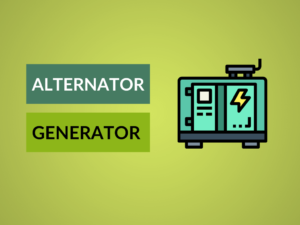AC Generator vs DC Generator: Understanding the Differences
Introduction: Have you ever wondered how electricity is generated? Two commonly used devices are the AC generator and the DC generator. In this article, we will explore the differences between these two types of generators and understand their applications. So, let’s dive in!
What is an AC Generator?
An AC generator, also known as an alternator, is a device that converts mechanical energy into alternating current (AC). It works based on the principles of electromagnetic induction, where a coil of wire rotates inside a magnetic field to generate electricity. This alternating current periodically changes its direction, typically 50 or 60 times per second.
Examples of AC Generators:
AC generators are widely used in various applications, including:
- Power plants
- Vehicles with alternators
- Electric generators in homes
- Hydropower stations
What is a DC Generator?
A DC generator, also known as a dynamo, is a device that converts mechanical energy into direct current (DC). It uses a split-ring commutator to achieve unidirectional flow of electric current. Unlike AC generators, DC generators produce current that flows in a single direction, without any periodic changes.
Examples of DC Generators:
DC generators find their applications in various fields, such as:
- Electric vehicles
- Battery charging stations
- Solar power systems
- Portable generators
Differences Table:
| Difference Area | AC Generator | DC Generator |
|---|---|---|
| Type of Current Produced | Alternating Current (AC) | Direct Current (DC) |
| Design Complexity | More complex design | Relatively simpler design |
| Commutator | No commutator is needed | Requires a split-ring commutator |
| Direction of Current | Periodically changes direction | Flows in one direction |
| Efficiency | Higher efficiency | Slightly lower efficiency |
| Power Generation | Primarily used for large-scale power generation | Commonly used for small-scale power generation |
| Applications | Electric grids, power plants, home generators | Electric vehicles, battery charging, small-scale systems |
| Complexity of Voltage Regulation | Requires advanced voltage regulation mechanisms | Relatively simpler voltage regulation |
| Maintenance | Less maintenance required | Requires periodic maintenance |
| Cost | Relatively cheaper | Costlier compared to AC generators |
Conclusion:
In summary, AC generators produce alternating current and find applications in large-scale power generation, while DC generators produce direct current and are commonly used for smaller-scale systems. AC generators have a more complex design and higher efficiency, but DC generators are relatively simpler and require periodic maintenance. The choice between an AC or DC generator depends on the specific requirements of the application.
People Also Ask:
- What is the main difference between an AC generator and a DC generator?
The main difference is that AC generators produce alternating current, while DC generators produce direct current. - Where are AC generators commonly used?
AC generators are commonly used in power plants, electric grids, and home generators. - Where are DC generators commonly used?
DC generators are commonly used in electric vehicles, battery charging stations, and small-scale systems. - Which generator is more efficient?
AC generators are generally more efficient compared to DC generators. - Are AC generators more expensive than DC generators?
No, AC generators are relatively cheaper compared to DC generators.


